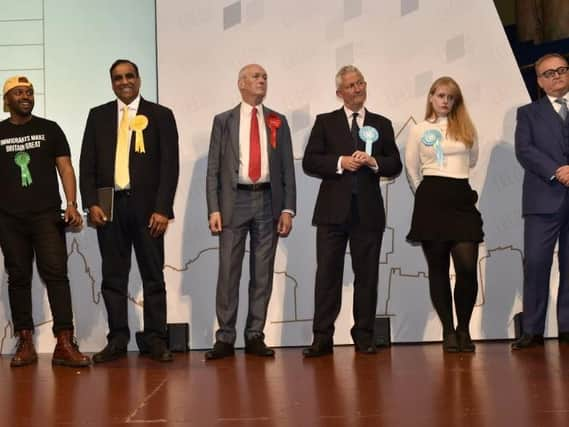The Brexit battle moves to Brussels as Yorkshire's MEPs prepare for final showdown


The EU elections revealed that voters remain as divided as MPs, and the result was polarised between the newly formed Brexit party and a handful of Remain parties, most notably the Liberal Democrats and the Greens.
The result was reflected in Yorkshire and the Humber, with the county’s electorate punishing the two main parties and returning three Brexit candidates, one Liberal Democrat, one Green and one Labour MEP.
Advertisement
Hide AdAdvertisement
Hide AdBut with Britain’s EU departure date set for October 31, and the European Parliament sitting for only three months between now and then, what impact can the new MEPs really have?
The Brexit party’s three candidates – John Longworth, Lucy Harris and John Pugh – will be taking a lead from their party leader, Nigel Farage, who during his 20-year stint as an MEP has seen his role as taking on the institution from the inside.
Explaining how he sees his role, Mr Longworth tells The Yorkshire Post: “The EU are quite capable of doing things that could be very problematic for the UK in the next five months.
“So it’s actually very important that there is somebody there calling them out and scrutinising them who really believe in Britain, as opposed to wanting to collaborate with the EU to try and get us back in.
Advertisement
Hide AdAdvertisement
Hide Ad“So, it’s extremely important that there are people able to do that and that is what all the MEPs intend to do.”
He adds: “In a constructive and rational way we have to push back because the EU get away with all sorts of things.”
In practical terms, the next month will see MEPs travelling to Brussels to form political alliances, arrange committees and assign leadership positions.
Those who are new to the role will get inductions and tours.
Advertisement
Hide AdAdvertisement
Hide AdYorkshire and the Humber’s only returning MEP, Labour’s Richard Corbett, is very familiar with the process, but notes that the October deadline could shift the dynamics.
“To be on a committee,” he says, “I don’t think that will be a problem at all but if you wanted to be chair of a committee people might say, ‘Oh, you’re only going to be here for three months or five months’.”
Turning to the large numbers of Brexit MEPs that Britain will be sending to the Belgian capital for the first time, he says: “Going from past experience when they were Ukip, they will turn up to the full plenary sessions to make the odd speech but they won’t do much work in parliamentary committees, which is where a lot of the nitty gritty is done in the European Parliament.
“That’s where a lot of the real work is done.”
July is when the European Parliament will properly kick into action again, before a month long summer recess stretching across August.
Advertisement
Hide AdAdvertisement
Hide AdAltogether the new MEPs will be officially working in Brussels and Strasburg for just three months, collecting over £30,000 each in salary over that period, plus expenses which run to just under £300 a day.
Holding the elections in the first place also came at a price, with the previous round of votes in 2014 costing the UK well over £100m.
But despite railing against the Brussels gravy train, Mr Longworth believes that this time round it was worth it.
He said: “There is always a cost to democracy. It was very costly to have a referendum that hasn’t actually been delivered.
Advertisement
Hide AdAdvertisement
Hide Ad“I would have preferred us to have already been out properly. But if we had gone ahead with the Prime Minister’s treaty, we would not have been out at all.
“In fact, we would have been locked into an international treaty forever, which would have been detrimental to the UK and would not have been Brexit.”
On his own remuneration, the business consultant and former director-general of the British Chambers of Commerce says he will not be seduced by the perks that come with being an EU politician.
“I have been going to Strasburg and Brussels for one reason and another for the last 45 years of my career on and off and it’s the most dismal place you could imagine,” he says.
Advertisement
Hide AdAdvertisement
Hide Ad“So, I don’t think I’m going to – anytime soon – want to be stuck there. They do have very nice restaurants and certainly the European Parliament seem to spend a lot of time drinking champagne and eating caviar at lunchtime. I have been to many events where that has happened. But nonetheless, I think I can forgo that because I’d much prefer to be in Harrogate.”
The lure of the lifestyle is equally unappealing for another of Yorkshire’s newly elected MEP’s, Liberal Democrat Shaffaq Mohammed.
“I am not going to be a champagne nationalist” he says.
“First of all, I don’t drink.”
Mr Shaffaq sees his role over the coming months as one centred around making his party’s anti-Brexit message heard on the continent.
He says: “It’s no different to when I was elected to Sheffield Council.
Advertisement
Hide AdAdvertisement
Hide Ad“You see this big daunting building and you need to get your head round how everything actually works and more importantly how do I get this to work for my constituents in Yorkshire and the Humber.
“That will be my number one.
“For me it’s just about being able to see how I can keep campaigning on the number one issue that matters to people – to stop Brexit.”